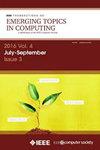Fair Influence Maximization in Social Networks: A Community-Based Evolutionary Algorithm
IF 5.1
2区 计算机科学
Q1 COMPUTER SCIENCE, INFORMATION SYSTEMS
IEEE Transactions on Emerging Topics in Computing
Pub Date : 2024-03-30
DOI:10.1109/TETC.2024.3403891
引用次数: 0
Abstract
Influence maximization (IM) has been extensively studied in network science, which attempts to find a subset of users to maximize the influence spread. A new variant of IM, fair IM (FIM), which primarily enhances the fair propagation of information, has attracted increasing attention in academia. However, existing algorithms for FIM suffer from a trade-off between fairness and running time, as it is difficult to ensure that users are fairly influenced in terms of sensitive attributes, such as race or gender, while maintaining a high influence spread. To tackle this problem, herein, we propose an effective and efficient community-based evolutionary algorithm for FIM (named CEA-FIM). In CEA-FIM, a community-based node selection strategy is proposed to identify potential nodes, which not only considers the size of the community but also the attributes of the nodes in the community. Subsequently, we designed an evolutionary algorithm based on the proposed node selection strategy to hasten the solution search, including the novel initialization, crossover, and mutation strategies. We validated the proposed algorithm by performing experiments on real-world and synthetic networks. The experimental results show that the proposed CEA-FIM achieves a better balance between effectiveness and efficiency than state-of-the-art methods do.社交网络中的公平影响力最大化:基于社群的进化算法
本文章由计算机程序翻译,如有差异,请以英文原文为准。
求助全文
约1分钟内获得全文
求助全文
来源期刊

IEEE Transactions on Emerging Topics in Computing
Computer Science-Computer Science (miscellaneous)
CiteScore
12.10
自引率
5.10%
发文量
113
期刊介绍:
IEEE Transactions on Emerging Topics in Computing publishes papers on emerging aspects of computer science, computing technology, and computing applications not currently covered by other IEEE Computer Society Transactions. Some examples of emerging topics in computing include: IT for Green, Synthetic and organic computing structures and systems, Advanced analytics, Social/occupational computing, Location-based/client computer systems, Morphic computer design, Electronic game systems, & Health-care IT.
 求助内容:
求助内容: 应助结果提醒方式:
应助结果提醒方式:


